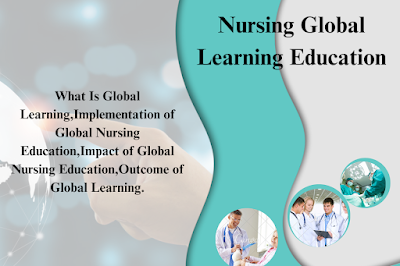What is Nursing Global Learning Education in health care education for better Patient outcomes.
The Nursing Global Learning Education
A global health perspective aims to endorse the wellbeing and equity for people globally through collaboration of many disciplines and by focus on population based prevention programs and individual clinical care (Koplan et al., 2009). Global health is the health of populations in a global context; Defined (by the Lancet) as “an area for study, research, and practice that places a priority on improving health and achieving equity in health for all people worldwide.
What Is Global Learning?
Global learning in nursing education is an integrated, comprehensive framework that offers students multiple ways of learning, including theoretical, experiential, and reflective methods. It involves a critical analysis of and engagement with complex, interdependent global systems and legacies, such as natural, physical, social, cultural, economic, and political systems, and their implications for people’s lives and the sustainability of the earth (Rhodes, 2010).
Through reflective and critical thinking, global learning enables students to develop a deeper understanding of themselves and their roles within the global community, both locally and internationally.
Implementation of Global Nursing Education
To address global health needs effectively, nurses must be educated as global citizens who possess both a moral responsibility and professional competence to promote health beyond their local communities and national institutions (Chavez, Peter, & Gastaldo, 2008). The concept of global interdependence calls for extending our thinking about moral responsibility and health to include a global perspective (Crigger, Brannigan, & Baird, 2006). Nussbaum (1997) outlines three capacities necessary for cultivating global citizenship:
- Reflexivity: The ability to critically examine one’s beliefs, traditions, habits, and self.
- Moral Cosmopolitanism: Adopting a view that considers all persons as equal in moral worth, deserving of equal moral consideration.
- Narrative Imagination: The capacity to imagine the experiences, emotions, and desires of people different from oneself, which is crucial for understanding diverse perspectives and fostering empathy (Nussbaum, 1997).
A theoretical framework, such as postcolonial feminism, offers an analytical lens to understand health’s impact through the intersecting factors of power, race, gender, and social class. This framework allows nurses to acknowledge their multiple roles as individuals and healthcare professionals, challenging preconceived notions of the “right way” to provide care and valuing all knowledge as context-specific (Anderson & McCann, 2002). By using this perspective, nurses can consider various meanings of health and illness and the complexities associated with global nursing practice.
Global learning helps nursing students become aware of their culturally ingrained perspectives on healthcare, enabling them to identify and challenge the underlying values and assumptions in their education and practice. It also helps them understand how social inequalities are constructed within political, historical, cultural, and economic contexts.
Impact of Global Nursing Education
Over a decade ago, Thorne (1997) noted that nursing education traditionally fostered social awareness within a limited, local sphere of influence. Although there was significant interest in international nursing and the perceived benefits of educational exchange programs, there was little analysis of what motivated students or how educators could foster a meaningful attitudinal shift in students through such programs.
In studying the experiences of globally aware nurses, Thorne found that most reported little or no formal training on topics relevant to a global perspective during their nursing programs. Additionally, those interested in integrating global health topics into their clinical learning often found little support from faculty or peers. Thorne argued that nursing education should promote a critical analysis of the status quo in healthcare and the larger society, particularly through international exchange programs that expose students to alternative (non-Western) health and social structures.
Several benefits have been identified in studies of international nursing education, including:
- Changed Values: Students develop a greater consciousness of social justice and global health issues.
- Improved Communication Skills: Exposure to different cultures enhances students’ ability to communicate effectively.
- Development of Confidence and Competency: International experiences help students learn to think creatively and develop their confidence and competence in diverse settings.
- Therapeutic Use of Self: Students learn to use themselves therapeutically in patient care (Evanson & Zust, 2006; Lee, 2004; Mill, Yonge, & Cameron, 2005; Sloand, Bower, & Groves, 2005).
Outcome of Global Learning
While there is a growing investment in various forms of global learning—such as global service learning, global health practicums, and international placements—systematic evaluation of these programs has received less attention. Nursing researchers have begun to assess the effectiveness of student learning in local contexts, but applying these findings to international settings remains challenging due to the complex factors that influence learning in diverse environments (Stufflebeam, 2001).
More rigorous strategies are needed to evaluate learning outcomes and practice related to international experiences and global learning. Evaluating programs like the Critical Perspectives in Global Health (CPGH) can reinforce common themes of transformative learning, but many such programs can only accommodate a limited number of students and remain elective rather than required courses. This raises the question of why many nursing curricula do not integrate global learning as a foundational or required course.
Conclusion
Global learning in nursing education equips students with the skills, knowledge, and attitudes necessary to navigate and address complex global health challenges. It broadens their perspectives, fosters empathy, and promotes cultural sensitivity, which are essential in an increasingly interconnected world. While the benefits of global learning are clear, further research and evaluation are necessary to refine these programs, ensure they meet their educational objectives, and advocate for their integration as a fundamental component of nursing curricula. By doing so, nursing education can better prepare future nurses to serve as competent and compassionate global health professionals.
Read More:
https://nurseseducator.com/didactic-and-dialectic-teaching-rationale-for-team-based-learning/
https://nurseseducator.com/high-fidelity-simulation-use-in-nursing-education/
First NCLEX Exam Center In Pakistan From Lahore (Mall of Lahore) to the Global Nursing
Categories of Journals: W, X, Y and Z Category Journal In Nursing Education
AI in Healthcare Content Creation: A Double-Edged Sword and Scary
Social Links:
https://www.facebook.com/nurseseducator/
https://www.instagram.com/nurseseducator/
